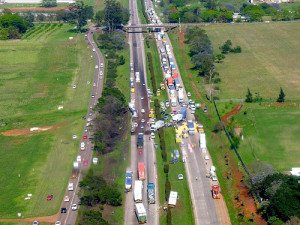
We hear horror stories all the time: a big-rig flipped on the interstate; a semi collided with a car; a trucker lost control of his rig. With more than 500,000 accidents involving trucks occurring each year, tales like these seem endless.
However, with adequate accident knowledge, you, your fleet managers, and your drivers can travel safely with accident preparedness. By reading the stats on common causes and these four helpful tips for avoiding accidents, you can evade your chances of becoming just another trucking accident statistic.
Common Causes and Prevention
Considering that most fleet trucks are nearly 20 times the size and weight of the average vehicle, it is no surprise that occupants of smaller cars are three times more likely to be killed in an accident than truck drivers.
When the truck is at fault, most of these accidents are a result of four common factors:
- Driver Error: Things like fatigue, inattention, distraction, and substance abuse make driver-error accidents ten times more common than other typical causes.
Be sure to choose a responsible, seasoned driver who can handle the demands. Don’t hesitate to break when tired or distracted and never drink and drive.
- Equipment Malfunction: Unfortunately many fleet managers disregard mandatory pre-trip inspections, leading many truck accidents to be caused by things like defective tires, faulty warning devices, bald break pads, and other mechanical issues.
Be sure you or your fleet managers properly inspect your rig before hitting the road – it’s a matter of life or death.
- Bad Weather: Many drivers don’t account for limitations caused by poor weather conditions like icy roads and poor visibility, causing many accidents to occur.
Be sure to check the weather and traffic conditions for the areas you’ll be passing through. Consider taking a different route or possibly postpone the trip if bad weather threatens the roads.
- Poor loading: Without proper weight distribution, the trailer becomes imbalanced and can risk tipping over. Without properly securing the trucks load, the content is more susceptible to falling off the truck and into the roadway.
Check, double-check, and triple-check your rig’s load to ensure the cargo follows proper loading protocol. Never hesitate to get a second opinion or ask for help.
With everyone taking a safer approach to the road, we can work together to decrease the staggering statistics of trucking accidents. Visit FleetServ for more information on ways you can better maintain your fleet, properly protect yourself and provide quality care for your drivers.
